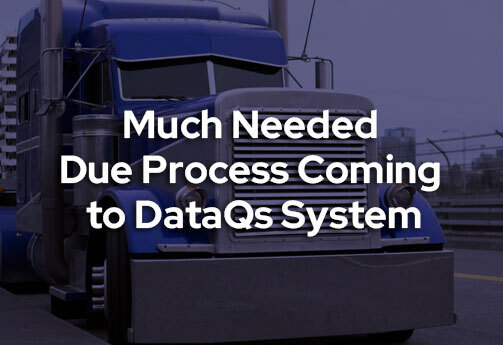Much needed due process coming to DataQs system

You may have heard about changes that the FMCSA is proposing to its online DataQs system, which gives users access to data issued by the agency believed to be incomplete or inaccurate.
Let’s break down what regulators have proposed and the possible impact on your fleet.
Proposed change: If implemented, the changes will provide deeper levels of appeal for drivers and carriers hit with erroneous violations during roadside inspections and safety audits.
What it means for fleets: A revamped DataQs appeals process is good news for our commercial fleet customers because it provides more avenues to help justify and improve CSA and SMS scores. Currently, when a fleet appeals a DataQs violation, its request traditionally ends up before the same department that issued the violation for evaluation – sometimes the same person. That can be a tough sell. Prior to the advent of instant replay review systems, Major League umpires or NFL referees rarely if ever reversed their decisions on the playing field.
To their credit, FMCSA recognized public concern and the need for more due process and third-party oversight when it comes to these kinds of scenarios:
“Stakeholders from the industry, CMV drivers, and the public have expressed concerns regarding the transparency and uniformity of addressing Requests for Data Review (RDRs), and specifically, RDR Reconsiderations. Stakeholders note that program offices do not have a uniform process for initial RDR reviews or for handling RDR Reconsiderations. They have also noted concern that RDR Reconsiderations are, in many instances, reviewed and decided by the same reviewer as the initial request. Users are calling on FMCSA to ensure an opportunity for an independent review, with consistently applied standards, for data correction requests.”
We support the idea of creating an independent appeals board to review challenges made by drivers and commercial fleet operators after their initial review has been denied. This helps ensure reconsideration requests are reviewed by someone other than the individual who conducted and denied the initial request – similar to going to the replay booth to review and ultimately decide on a controversial call. This proposal can also help inject some of the missing due process into a separate proposal to overhaul the agency’s BASICs with updated safety categories. The opportunity to overturn an erroneous violation can lead to lower CSA BASIC scores, reduce insurance premiums at renewal, and improve relationships with freight brokers.
Our Conclusion: The proposal should provide the trucking industry with the due process it deserves, and we look forward to seeing positive results after the new rules go into effect soon after the public comment period ends in mid-November.


